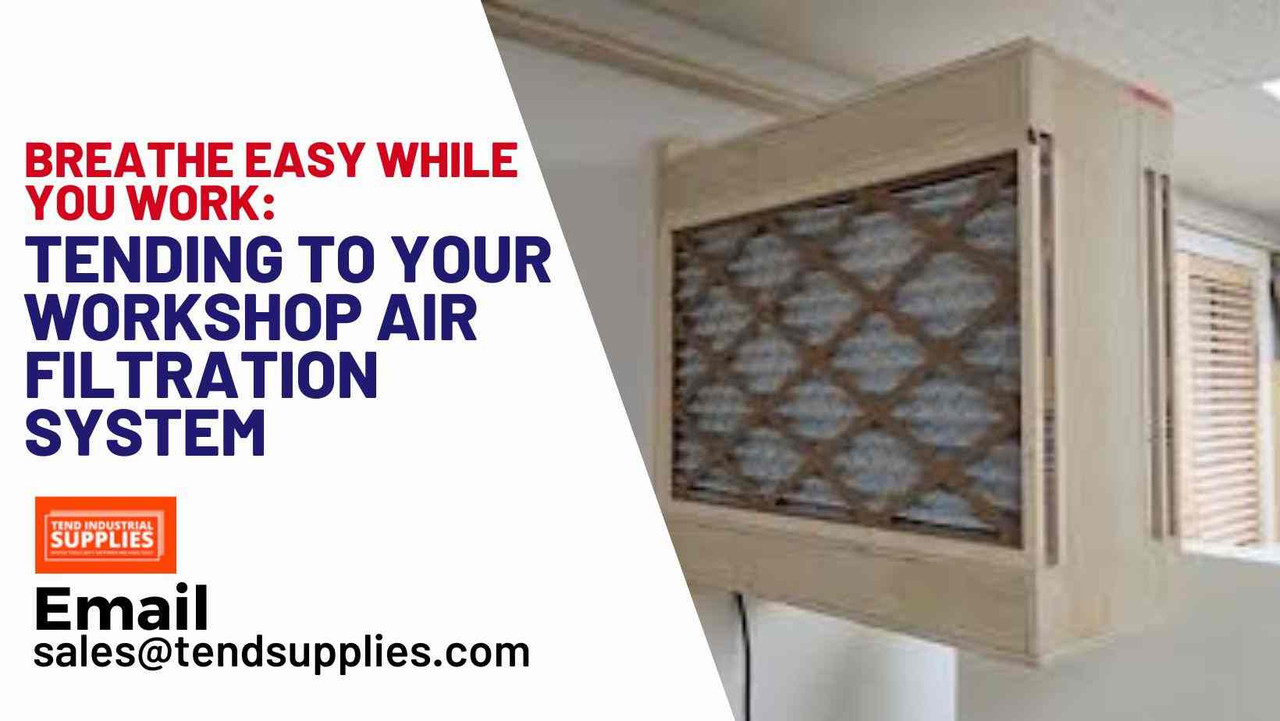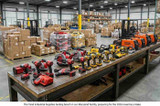Breathe Easy While You Work: Tending to Your Workshop Air Filtration System
Maintaining a clean and healthy working environment in your workshop is essential for your safety and productivity. A reliable air filtration system is one of the most critical components in achieving this. This article will explore how to tend to your workshop air filtration system, ensuring you and your tools operate in the best possible conditions.
Key Takeaway
Maintaining a clean and healthy workshop environment is essential for your health and work quality. Regular maintenance and optimization of your air filtration system can ensure that you breathe easy while you work and keep your tools in top condition.
Understanding Workshop Air Filtration Systems: Keeping Your Shop Clean and Safe
A clean and healthy workshop environment is essential for both the quality of your work and your own well-being. Woodworking, metalworking, and other workshop activities can create a lot of dust and fumes, irritating your lungs and making it difficult to see clearly. This is where workshop air filtration systems come in.
What is a Workshop Air Filtration System?
A workshop air filtration system is a machine that helps to remove dust, fumes, and other contaminants from the air. These systems typically use a fan to draw in dirty air, which is then passed through a series of filters. The filters capture the contaminants, and clean air is then circulated back into the workshop.
Why Do I Need a Workshop Air Filtration System?
There are several reasons why you might need a workshop air filtration system:
- Improved Air Quality: The primary benefit of an air filtration system is that it improves the air quality in your workshop. This can help to protect you from inhaling harmful dust and fumes, which can irritate your lungs and lead to respiratory problems.
- Better Visibility: Dust and fumes can obscure your vision, making it difficult to see what you're doing. An air filtration system can help to improve visibility in your workshop, making it safer and easier to work.
- Reduced Risk of Fire: Some dust particles, such as sawdust, are highly flammable. An air filtration system can reduce the amount of dust in the air, which can help prevent fires.
- Protecting Your Tools: Dust and other contaminants can damage your tools over time. An air filtration system can protect your investment by keeping your tools clean.
Choosing a Workshop Air Filtration System
There are a variety of workshop air filtration systems on the market, so it's essential to choose one that is right for your needs. Here are some factors to consider:
- The size of your workshop: Larger workshops will need a more powerful air filtration system than smaller workshops.
- The type of work you do: The kind of dust and fumes generated in your workshop will determine the type of filter you need. For example, if you do a lot of woodworking, you will need a system to capture fine sawdust particles.
- Your budget: Workshop air filtration systems can range from around $100 to several thousand dollars.
A workshop air filtration system is a valuable investment that can help improve your workshop's air quality, protect your health, and keep your tools safe. Considering the abovementioned factors, you can choose the right system for your needs and budget.
Air filtration systems are designed to remove contaminants, including dust, fumes, and other particulates. These systems are essential in workshops, where various processes generate airborne pollutants that can affect health and the quality of work.
Why is Air Filtration Important?
- Health and Safety: Poor air quality can lead to respiratory issues, allergies, and other health problems. A sound air filtration system ensures you breathe clean air while working.
- Tool Longevity: Dust and debris can damage your tools over time. Air filtration systems help keep your equipment clean and functioning correctly.
- Work Quality: Clean air prevents contaminants from settling on your workpieces, ensuring a higher-quality finish.
Types of Workshop Air Filtration Systems
There are several types of air filtration systems available, each designed for specific applications and workshop environments:
- Portable Air Cleaners
- Ideal for smaller workshops or areas where flexibility is needed, these units can be moved around as needed to provide localized air filtration.
- Centralized Air Filtration Systems
- These systems are integrated into the workshop's HVAC system, providing comprehensive air cleaning for larger spaces. They are more powerful and can handle higher volumes of air.
- Downdraft Tables
- They are specifically designed for tasks that generate a lot of dust and fumes, such as sanding and welding. These tables draw contaminants away from the work surface and filter them out.
- Overhead Air Cleaners
- Mounted on the ceiling, these units circulate and filter air throughout the workshop. They are effective for improving general air quality in medium—to large workshops.
Maintaining Your Workshop Air Filtration System
Proper air filtration system maintenance is crucial for its effectiveness and longevity. Here are some essential maintenance tips:
- Regular Filter Replacement
- According to the manufacturer's recommendations, filters should be checked and replaced regularly. Dirty filters can reduce airflow and filtration efficiency.
- Cleaning Pre-Filters
- Many systems have pre-filters that capture larger particles before they reach the main filter. These should be cleaned or replaced as needed to prevent clogging.
- Inspecting Seals and Gaskets
- Ensure that all seals and gaskets are intact and not damaged. Leaks can reduce the effectiveness of your filtration system.
- Monitoring Airflow
- Keep an eye on the airflow of your system. Reduced airflow can indicate a clogged filter or other issues that need addressing.
- Professional Servicing
- Consider having your system professionally serviced periodically. This can help identify and fix any issues that may not be apparent through routine maintenance.
Troubleshooting Common Air Filtration Issues
Even with regular maintenance, you may encounter some common issues with your air filtration system. Here are solutions to a few typical problems:
- Reduced Airflow: Check for clogged filters and clean or replace them as needed. Inspect the ducts and vents for any obstructions.
- Unpleasant Odors: Ensure that the filters are on time for replacement. Odors can also indicate the presence of mold or other contaminants in the system.
- Noisy Operation: Noise can be caused by loose components or a failing motor. Tighten any loose parts and consider replacing the motor if necessary.
Advanced Tips for Optimizing Air Filtration
For workshops that require higher standards of air quality, here are some advanced tips:
- Use HEPA Filters
- High-Efficiency Particulate Air (HEPA) filters can capture very small particles, including many that standard filters miss. They are ideal for environments with high levels of fine dust or allergens.
- Implement Zoning
- Divide your workshop into different zones, each with its own air filtration needs. This allows for more targeted and efficient air cleaning.
- Add Air Purifiers
- In addition to your main filtration system, consider using portable air purifiers in specific areas where air quality needs to be particularly high.
- Monitor Air Quality
- Use air quality monitors to keep track of particulate levels in your workshop. This can help you adjust your filtration system as needed.
- Regular Training
- Ensure that everyone in the workshop understands the importance of air filtration and how to maintain the system properly.
Frequently Asked Questions (FAQs)
- How often should I replace the filters in my air filtration system?
- Filter replacement frequency depends on the type of filter and the level of contaminants in your workshop. Check the manufacturer's recommendations and inspect filters regularly.
- Can I clean and reuse air filters?
- Some filters are washable and reusable, while others need to be replaced. Follow the manufacturer's guidelines for your specific filters.
- What size air filtration system do I need for my workshop?
- The size of the system depends on the volume of air in your workshop and the level of contaminants. Larger workshops with more contaminants will need more powerful systems.
- Are portable air cleaners effective?
- Yes, portable air cleaners can be very effective for localized air filtration. They are especially useful in smaller workshops or for specific tasks that generate a lot of dust.
- How do I know if my air filtration system is working properly?
- Monitor the airflow and air quality in your workshop regularly. Reduced airflow, unpleasant odors, or an increase in dust may indicate a problem with your system.
Call to Action
For high-quality air filtration systems and maintenance supplies, visit Tend Industrial Supplies. Our extensive range of products ensures you have everything you need to keep your workshop air clean and healthy. Contact us at sales@tendsupplies.com for more information and expert advice.









